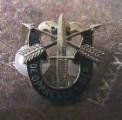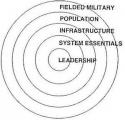Bill,
Nice post. This is always the big question, of what to do first, and what to prioritize. The majority position in military circles is to establish security first. Some come to that because, like Tranquier, they see security as the entire issue. Some because they see the populace as the prize, but rationalize that they can't get at them effectively to bring them under control until they have a reasonable degree of security in place. Like a sinking boat with a large hole in it: does one bail or plug the hole?? There may be too much water to get at the hole, or the water may be threatening to swamp the boat. But the bailing may not be able to keep up with the amount coming in the hole, or perhaps is only marginally faster, so the process is guaranteed to be long and tiring, but water never tires... Security first is bailing the boat. Balance and prioritize.
I ran into a similar circumstance when I left the regular army to go to law school. Wanting to stay in the military in some capacity I joined the Guard. Going from an ODA Commander in 5th SFG to being the new guy in a Guard Light Infantry Brigade was a bit of a culture shock. Lesson one was that the AC is a training readiness focused organization, while the Guard is a personnel readiness focused organization. Success of Commanders, Budget decisions, what states get what units and what equipment, etc are all made based upon the ability to produce units with a high percentage of available MOS qualified personnel. Period. How well they could perform was not a factor. This led to the great debate: should one train to unit capability, or should one focus on recruiting and individual capability? The standard Guard position was that a unit could not train until it was well manned, so focus on recruiting and individual training. The problem was they never got there, so they never trained. Also, as units spent so much time at the armory doing boring individual tasks, or events and parties intended to attract recruits, most really good soldiers would give up after a few years, and the organization in a Darwinian way became predominated by guys who saw it more as a social club than a military organization (with notable exceptions of course).
Ever the iconoclast, myself and another young major took the position of "train to retain"; and pushed for aggressive collective training and maximization of drill weekends. We soon build a cult following of young soldiers and junior leaders who really wanted to soldier. Social soldiers went to other units or got out, and soldiers who wanted to really soldier were drawn to the units that made training a priority. I never saw a unit that focused on hard, realistic training suffer for long for low numbers. The key was in determining the decisive point.
For Guard recruiting and retention I determined that the decisive point was when the soldier returned home following a drill weekend, and when he went to work. It was how he answered the question of "how was your weekend" by a spouse whose sister's wedding she had attended alone that weekend, or by a child who had a big ball game, or by a co-worker who had gone on a big hunting or skiing trip. If his answer was "I had to go to drill and we hung out at the armory" I knew the follow-on question would be fatal "so why do you do it?" Recruit the soldier, but retain the wife. If he had great war stories to tell with fire in his eye about how hard it was the wife and kids would support him and his buddies would want to join. By focusing on the decisive point the "recruit or train" question was easy to answer.
But what is the decisive point for COIN?
But what if the populace is not the "prize" and the insurgent is not the "cause"??? Perhaps we are all focused on the wrong problem. I just read the great French piece on Galula to Petraeus http://smallwarsjournal.com/blog/201...d-galula-to-p/ and it lays out the key points of Tranquier, Galula, Kilcullen and Petraeus. Tranquier is great for those doing CT; but is not COIN. The other three are all in the beaten zone for COIN, but in my opinion miss two critical points:
1. All saw/see the intervening power as the "counterinsurgent." In the current globalized environment I believe this is even more of a fatal mistake than it has been historically. But in the colonial era the role of the intervening power was to sustain in power a government that answered to them first, and then to the populace. Today this just is not the case, and is a habit we must break. This is the flaw of all colonial COIN, be it French, British, or USMC Small Wars Manual. The intervening power today does NOT want "control" over the Government or the Populace either one. To do so, to even create the Perception of Control is to:
A. Render the Host Nation Government Illegitimate in the eyes of the populaces, thereby stoking the flames of insurgency, and
B. Make the intervening power the target of terrorist attack, at home as well as in the host nation.
2. All fail to identify the government as the principal factor of causation. Tranquier placed all blame on external UW actors. The rest place blame on a populace that yes, questions legitimacy, but more importantly does so due to the effects of insurgent ideology and lack of effective government services.
So, I think this causes us to mis-identify the decisive point, and therefore make poor decisions as what to prioritize and how to balance our efforts. I say make fixing the government the priority, balance that with information operations that admit to past failures of government, agree with and co-opt vast swaths of the insurgent's message, and proclaim hard internal fixes being made to address all of the above. Only third after this comes security efforts focused on key elements of governmental outreach and key nodes of the insurgency itself.
A long post, I realize, but these two points of the intervener not being the counterinsurgent and the repair of governance as the decisive point largely missed in mainstream COIN doctrine and theory is critical. More so than ever in today's information age of empowered populaces.












 ) once said, there's a fine line between admirable persistence and deplorable bullheadedness. You aren't there yet -- but I really don't think going there will do your cause one bit of good...
) once said, there's a fine line between admirable persistence and deplorable bullheadedness. You aren't there yet -- but I really don't think going there will do your cause one bit of good...





Bookmarks